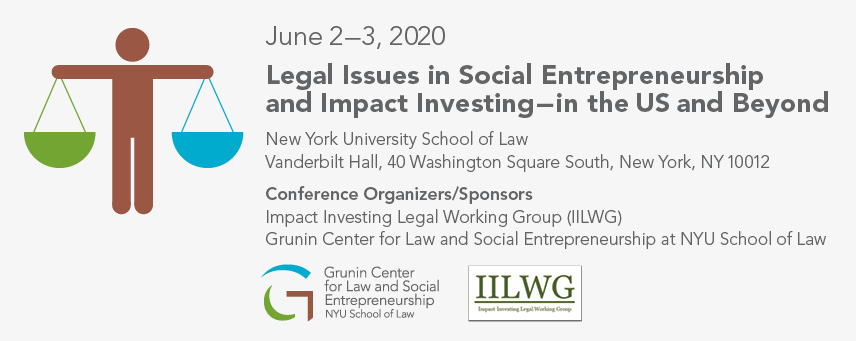2019 People's Choice Topics
2019 People's Choice Topics
In 2019, the Annual Conference on Legal Issues in Social Entrepreneurship and Impact Investing—in the US and Beyond featured the following five People’s Choice panels. We are grateful to the following people for suggesting and then organizing these sessions: Ryan Dings, Dina Ellis Rochkind, Kate Kilberg, Anthony Luppino, Perry Teicher, Etienne C. Toussaint, and John E. Tyler.
Blockchain For Impact: How Distributed Ledger Technologies and Cryptocurrencies Can Change the World. This panel explored how distributed ledger technologies (DLT) can be used to impact social change globally. Some of the topics discussed included: how DLT can create efficiencies in philanthropy; how DLT can bring about broader access to mainstream financial services; how DLT are being used to meet the UN Sustainable Development Goals; how DLT can be used to catch bad actors; how DLT make it easier to trace measurable outputs; and how to make DLT understandable and usable for the masses.
Panelists:
- Colborn Bell, Founder, 5th Element Group PBC; Director, SDG Impact Fund
- Barbara Bickham, Founder and Managing Partner, Women’s Innovation Fund Accelerator
- Vincent Molinari, Co-Founder, Templum
- Rina Singh, Founder, Trinity Institute, Technology for Humanity
- Lucas Tesler, Co-Founder, Goodbit
Moderator: Dina Ellis Rochkind, Of Counsel, Paul Hastings
Equity and Inclusion in Impact Investing and Social Enterprise. This session considered barriers to participation in impact investing and social enterprise related to race, gender, ethnicity, religion, ability, and sexuality both from the perspective of the investor and the entrepreneur seeking funding. How can we empower entrepreneurs from underrepresented groups to seek funding? How can we maximize their chances of success? How can we minimize bias in the funding process? How can we empower investors from underrepresented groups to engage in impact investing?
Panelists:
- John W. Haines, Director, Mercy Corps Community Investment Trust
- Astrid Scholz, Treasurer, XXcelerate Fund
- Dara Westling, Investor Relations, Direct Public Offering / RegA+ Crowdinvesting Offering
Moderator: Kate Kilberg, Partner, Catalyst Law, LLC
The Ethics of Impact Bonds. As public resources for social welfare services and international development dwindle or flatline, social finance has emerged as a wellspring of hope amidst increasing fiscal austerity and political partisanship. Yet, as mission-driven impact investors gravitate toward creative public-private partnerships that promise double bottom-line returns, such as the range of impact bond arrangements (both social impact bonds and development impact bonds) being explored domestically and across the globe, scholars and advocates alike are beginning to wrestle with complex ethical questions that pose uncertain implications for government. This panel explored these varied challenges and offered guidance for the future of social finance via impact bonds.
Panelists:
- Navjeet K. Bal, Managing Director and General Counsel, Social Finance US
- Deborah Burand, Associate Professor of Clinical Law, Faculty Co-Director of the Grunin Center for Law and Social Entrepreneurship, Director of International Transactions Clinic, New York University School of Law
- Susan De Witt, Senior Project Manager – Innovative Finance, Bertha Centre for Social Innovation & Entrepreneurship, Graduate School of Business, University of Cape Town
- Jonathan Ng, Attorney Advisor, Office of the General Counsel, US Agency for International Development (USAID)
Moderator: Etienne C. Toussaint, Assistant Professor of Law, University of the District of Columbia, David A. Clarke School of Law
Organizational Options and Differentiated Social Good. This panel consisted of a lively debate on the value, usefulness, practice, and policy implications of social purpose businesses structured through traditional or modified traditional forms versus newer hybrid/blended forms. Panelists presented diverse points of view on questions such as: Is it enough to focus on potential for pursuing social good while permitting prioritization of owners’ financial returns? Should focus be on “differentiation” of social good distinguishable from what business and charities already pursue? Should “differentiation” be to define social good, how it is pursued, accountability, or some combination? How might such “differentiation” occur? How might failure to “differentiate” affect capital flow to social good?
Panelists:
- Allen Bromberger, Partner, Perlman & Perlman
- Nicholas Glicher, Chief Operating Officer, Thomson Reuters Foundation
- Joan Heminway, Professor of Law, University of Tennessee College of Law
- Tony Luppino, Professor of Law and Director of Entrepreneurship Programs, University of Missouri-Kansas City School of Law
Moderator: John E. Tyler, General Counsel, Ewing Marion Kauffman Foundation; Course Designer and Lecturer, Columbia University
Why wait for the Green New Deal? Impact Investment’s Role in Supporting an Equitable Transition to a Clean Energy Economy. Recent attention, including the Green New Deal, Intergovernmental Panel on Climate Change (IPCC) reports, and increasing numbers of displaced and destroyed communities, have vaulted proposed aggressive responses to popular awareness. While this attention has contributed new energy to the movement, current legislation, policy, and strategies exist that can accomplish at least some of the Green New Deal goals, including renewable energy’s investment tax credit, which has not been fully utilized due to complexities in the legal structure. This panel explored the legal structures for expanding the use of investment tax credits for individuals and corporations who can employ their tax dollars to invest in inclusive clean energy projects, climate justice community engagement strategies, and other financing structures to accelerate the transition to an inclusive clean energy economy.
Panelists:
- Ryan Dings, Chief Operating Officer, Sunwealth
- Dorcas Gilmore, Visiting Associate Professor of Law, University of Maryland Carey School of Law; Gilmore Khandhar, LLC
- John Tobin, Professor of Practice, SC Johnson College of Business, Cornell University
Moderator: Perry Teicher, Impact Finance Attorney, Orrick, Herrington & Sutcliffe


